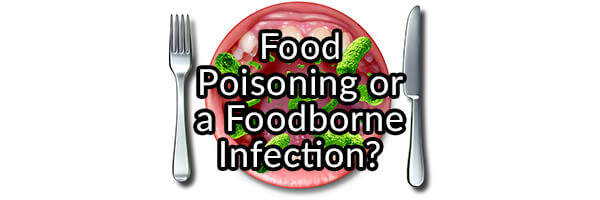In bacterial foodborne gastrointestinal illnesses, there is a difference between classical food poisoning and foodborne infections. Food poisoning occurs after the consumption of food containing bacterial toxins (examples include E. coli, B. cereus, and Clostridium botulinum).1 Most bacteria that cause food poisoning become inactivated upon ingestion by stomach acid and do not usually infect their hosts. The toxins they produce cause the actual illness.2 The main symptom of toxin-related food poisoning is diarrhea because of the activation of TRPV1 receptors in the gut by the toxins. The activation of the TRPV1 receptors causes loose stools because of a defense mechanism of the body trying to rid itself of the offending toxins.3 4 Vomiting, tachycardia, and headaches may also occur with food poisoning. Low-grade fever can also occur, but it is rare. Clostridium botulinum toxin poisoning is a serious medical emergency and causes symptoms like paralysis and breathing trouble. Symptoms of food poisoning can occur in foodborne infections, but the overall range of symptoms most of the time are self-limiting (except for Clostridium botulinum).5 6
Foodborne bacterial infections occur when the contaminated food or water acts as a delivery system and reservoir for the bacteria (Campylobacter, H. pylori, Salmonella, Shigella, and Listeria monocytogenes) so that the bacteria can propagate and cause an infection. Once the bacteria colonize they rapidly produce toxins in the bowel. Similar symptoms of food poisoning occur include diarrhea, vomiting, tachycardia, and headaches. Elevated fever and chills are one of the main symptoms that separate foodborne illnesses and food poisoning. Foodborne bacterial infections regimen choices depend on the severity of the infection, and some may require hospitalization and antibiotic use.7 8
Antibiotic therapy is contraindicated in true food poisoning because the toxins ingested not bacterial infection is what makes you ill. Most of the time there is no infection associated with true food poisoning. Antitoxins and hospitalization may be needed in a severe case of food poisoning. Foodborne infection, on the other hand, may need antibiotic therapy and hospitalization depending on the severity of the bacterial infection.9 10 Anti-diarrheal medicine should also be avoided unless necessary. Use of anti-diarrheal medication has been linked to poor outcomes and longer hospitalization, because diarrhea is a defense mechanism by the body to eliminate toxins and bacteria through the bowels.11
One of the most important things you can do while ill is to remain hydrated especially if you are vomiting and have diarrhea. I recommend every hour at least drinking a mixture of: 1/2 – one teaspoon of Real Salt, 300 mg of potassium gluconate, and 200 mg of magnesium glycinate in a ten – twelve ounce glass of filtered water.
Foodborne Infection Protocol
- GutPro – 1/8 tsp. before bed with a glass of filtered water.
- Bismuth
- Upgraded™ Activated Charcoal – Two capsules every thirty minutes until vomiting and diarrhea stop. Take no more than twelve capsules per day.
- Follow SIBO antibacterial and biofilm elimination protocols.
- Pure Encapsulations zinc carnosine – four capsules with food throughout the day.
If the diarrhea does not stop in a couple of days, or if the diarrhea is very serious:
- Rainforest Pharmacy Sangre De Drago – follow the general supplement bottle recommendations
The activated charcoal and bismuth are to help absorb bacterial endotoxins.12
Sangre De Drago and zinc have been shown clinically to stop diarrhea.13
Probiotics, natural antibacterial agents, and anti-biofilm agents may help reduce opportunistic bacteria causing the foodborne infection.
Food Poisoning Protocol
- Upgraded™ Activated Charcoal – Two capsules every thirty minutes until vomiting and diarrhea stop (no more than twelve capsules per day).
- Bismuth
- Jarrow Formulas milk thistle – Follow supplement bottle recommendations.
- Pure Encapsulations zinc carnosine – four capsules with food throughout the day.
If the diarrhea does not stop in a couple of days, or if the diarrhea is very serious:
- Rainforest Pharmacy Sangre De Drago – follow the general supplement bottle recommendations
The activated charcoal / bismuth are to help absorb bacterial endotoxins.
Sangre De Drago and zinc have been shown clinically to help relieve diarrhea.14
Milk thistle will improve liver function to help reduce endotoxins.
- Beers, Mark. The Merck Manual, Merck Research Laboratories, 2006. ↩
- Tamparo, Carol, Lewis, Marcia. Diseases of the Human Body, F. A. Davis Company, Feb. 11, 2011. ↩
- http://www.ncbi.nlm.nih.gov/pmc/articles/PMC3400813/ ↩
- http://www.ncbi.nlm.nih.gov/pmc/articles/PMC2564830/ ↩
- Beers, Mark. The Merck Manual, Merck Research Laboratories, 2006. ↩
- Tamparo, Carol, Lewis, Marcia. Diseases of the Human Body, F. A. Davis Company, Feb. 11, 2011. ↩
- Beers, Mark. The Merck Manual, Merck Research Laboratories, 2006. ↩
- Tamparo, Carol, Lewis, Marcia. Diseases of the Human Body, F. A. Davis Company, Feb. 11, 2011. ↩
- Beers, Mark. The Merck Manual, Merck Research Laboratories, 2006. ↩
- Tamparo, Carol, Lewis, Marcia. Diseases of the Human Body, F. A. Davis Company, Feb. 11, 2011. ↩
- http://www.mayoclinic.org/first-aid/first-aid-food-borne-illness/basics/art-20056689 ↩
- http://wellnessmama.com/3334/food-poisoning-remedies/ ↩
- http://www.ncbi.nlm.nih.gov/pubmed/10898763 ↩
- http://ije.oxfordjournals.org/content/39/suppl_1/i63.full ↩






